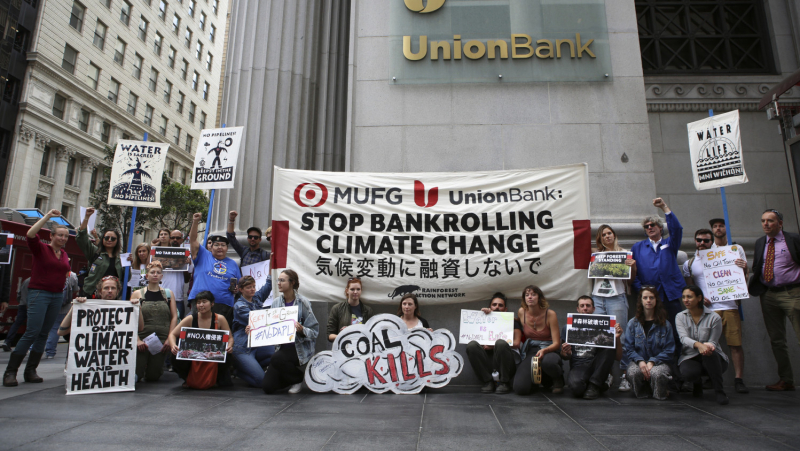Japan’s largest bank MUFG tightens coal power and forest sector policies - but far from aligned with Paris Agreement
Kiko Network, Kimiko Hirata, khirata[@]kikonet.org
Market Forces, Meg Fukuzawa, meg.fukuzawa[@]marketforces.
Rainforest Action Network, Emma Lierley, emma[@]ran.org

Kiko Network, Kimiko Hirata, khirata[@]kikonet.org
Market Forces, Meg Fukuzawa, meg.fukuzawa[@]marketforces.
Rainforest Action Network, Emma Lierley, emma[@]ran.org
Today, Japan’s largest bank Mitsubishi UFJ Financial Group (MUFG) (TYO: 8306) announced a revision of its Environmental and Social Policy Framework (1) policy for the coal-fired power, forestry and palm oil sectors. NGOs have responded as follows:
Kimiko Hirata, International Director of Kiko Network said: “This revision has strengthened measures in some sectors, but it is still inadequate as a response to the urgent climate crisis. I hope that MUFG, a leading financial institution in Japan, will formulate more ambitious coal-related policies in line with the achievement of the 1.5-degree target of the Paris Agreement, and strengthen the policies regarding other fossil fuels and deforestation-causing commodities. "
In this revision, MUFG stipulates that in principle, it will not provide financing for the expansion of existing coal-fired power generation facilities, adding to its previous pledge to not finance the construction of new coal-fired power plants. However, the policy leaves a worrying exception and states “coal-fired power generations equipped with CCUS, Mixed combustion, and other technologies necessary to achieve the Paris Agreement target may be considered on an individual basis.” It is believed that neither CCUS nor mixed combustion will contribute much to the emissions reduction needed by 2030, and instead only prolongs the life of coal-fired power. MUFG’s support for these technologies is therefore inconsistent with the Paris Agreement.
Takayoshi Yokoyama, Representative of 350.org Japan, said, "It is a big concern that the scope of MUFG's sector policy is basically limited to project finance and does not address corporate finance. According to the Global Coal Exit List finance research, MUFG's lending to the coal industry is the third largest in the world (2)). MUFG’s policy on the coal-fired sector should therefore be expanded to corporate finance that covers the entire value chain, and a phase-out strategy should be formulated on a time frame that is consistent with the Paris Agreement. MUFG’s current revisions fail to achieve this.”
MUFG is also one of the world's leading financial institutions funding companies causing tropical forest destruction, and has significant ESG exposure to clients in the palm oil and pulp and paper sectors. In particular, the amount of loans and underwriting to the palm oil sector is the largest among banks headquartered in regions other than Southeast Asia, and is increasing its presence in Southeast Asia through its acquisition of Bank Danamon, the sixth largest bank in Indonesia.
Toyoyuki Kawakami, Japan's representative of the Rainforest Action Network (RAN), said, "We are encouraged by MUFG’s additional requirement for clients ‘to publicly commit to No Deforestation, No Peat and No Exploitation (NDPE).’ However, the standard only applies to palm oil plantation companies and excludes purchasers of palm oil such as traders and brands. It is also very disappointing that the NDPE standard does not apply to other commodities such as pulp and paper that are also destroying rainforests and peatlands. MUFG’s decision to not require independent verification of compliance with NDPE, nor prohibit the use of fire for plantation development is a major failure in terms of addressing the climate crisis."
It is also of great concern that the revised policy has no changes to MUFG’s stance on oil and gas, nor a commitment to phase out such finance in line with the goals of the Paris Agreement. Meg Fukuzawa, Energy Campaigner for Market Forces, said, "MUFG and other Japanese financial institutions have substantial exposure to fossil fuel companies. Among them, a report released in March by RAN and others found MUFG ranked the 6th largest fossil fuel banker in the world and the largest in Asia in terms of loans and underwritings to all fossil fuels over the last 5 years since the Paris Agreement. Even with this revision, MUFG’s fossil fuel sector policy is wholly inadequate compared to other financial institutions. As more and more investors and financial institutions around the world commit to net zero financed emissions by 2050, MUFG is significantly lagging behind.”
In March of this year, Japanese NGO Kiko Network and three individual shareholders affiliated with environmental NGOs filed a shareholder proposal to MUFG calling on the bank to “adopt and disclose in its annual reporting a plan outlining its business strategy... to align its financing and investments with the goals of the Paris Agreement.”(3) There remains a significant gap between MUFG’s revised policy and the content of the shareholder proposal, and the new policy cannot be said to be consistent with the 1.5°C goal of the Paris Agreement. As shareholders, we will continue to hold discussions with MUFG.
Notes to the Editor:
-
MUFG’s revised financing policy is available at: https://www.mufg.jp/dam/
pressrelease/2021/pdf/news- 20210426-001_en.pdf -
Global Coal Exit methodology and findings can be found at: https://coalexit.org/
methodology and https://coalexit.org/finance- data -
The Shareholder Proposal on MUFG was filed on March 26 2021 by Kiko Network and representatives of Australian NGO Market Forces, US NGO Rainforest Action Network (RAN), and 350,org Japan, who joined as co-filers of this resolution in an individual capacity. Details on the resolution can be found at: https://www.kikonet.org/press-
release-en/2021-03-29/MUFG- shareholder-resolution
